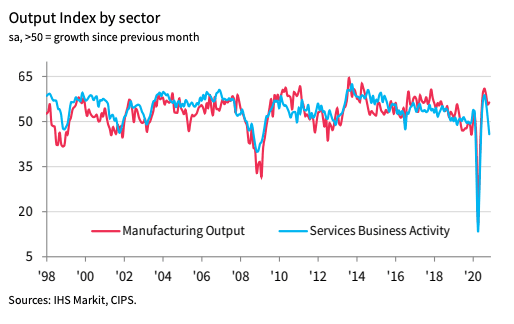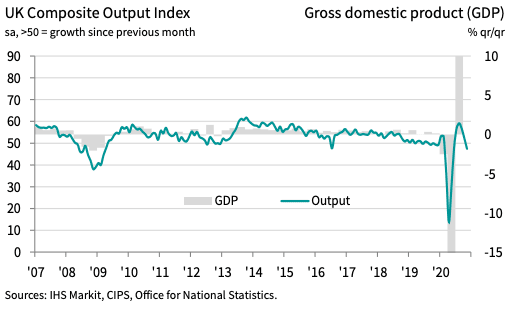PMIs - "Economy Holding up Better-than-expected in Second Lockdown"
- Nov. PMIs beat expectation
- Manufacturing sector in strong expansion
- Suggests 2nd lockdown will have smaller impact than 1st

Image © Adobe Images
Data out of the UK economy for November came in well ahead of expectation, even if they do confirm the economy likely shrank in the same month that England went into a second lockdown.
The PMI survey from IHS Markit - which gives the most up to date and comprehensive short-term snapshot of how the economy is performing - showed that while the dominant services sector shrank, manufacturing grew.
The Services PMI for November read at 45.8, which is below the 50.0 level that forms the divide between growth and decline. While the sector is in decline, the reading was better than the 42.5 reading the market was expecting.
The Manufacturing PMI read at 55.2, which is well ahead of the 50.5 forecast by economists and better than the previous month's reading of 53.7.
IHS Markit say manufacturing growth was mainly linked to a sustained recovery in production volumes after stoppages at the start of the pandemic but survey respondents also commented on rising demand from export markets, especially in China and the EU.
The Composite PMI - which takes both into account but calibrates them to represent their respective shares of the economy - read at 47.4, which is below October's 52.1 but better than the consensus expectation for 43.5.
"Some comfort comes from the data suggesting that the impact of the lockdown has not been as severe as in the spring, and manufacturing has also received a significant boost from inventory building and a surge in exports ahead of the UK’s departure from the EU at the end of the year, providing a fillip for many companies," says Chris Williamson, Chief Business Economist at IHS Markit.

"The relatively small fall in November’s flash composite PMI suggests that the hit to GDP from the second lockdown will be much smaller than the first and that our expectation of an 8% m/m drop in GDP in November may be too pessimistic," says Thomas Pugh, UK Economist at Capital Economics. "The PMIs have not been a great gauge of the level or growth rate of GDP recently. But based on the relationship between the composite PMI and GDP during the first lockdown, a reading of 47.3 would be consistent with GDP falling by about 2% m/m in November. That’s less downbeat than our current forecast of an 8% m/m drop."
IHS Markit report export sales to have been "a bright spot" in November, with the latest increase the fastest since January 2018.
Employment dynamics were a concern as the rate of job shedding across the service sector accelerated to its fastest since August according to the survey. Around three times as many survey respondents (27%) reported a decline in employment as those that indicated a rise during November (9%).
Concerning the outlook, the arrival of vaccines to combat the covid-19 pandemic are said to be playing a positive role in the future expectations of businesses.
"News of potential vaccines bringing a return to normality lifted the mood with a big rise in optimism to its highest since March 2015. But in the meantime with service businesses still shedding jobs at a head-spinning rate, the New Year will be difficult as another recession waits on the doorstep," says Duncan Brock, Group Director at CIPS, who sponsor the report.
The November flash PMI comes on the same day that AstraZeneca and Oxford University announce their vaccine candidate was successful in preventing covid-19 infection.
The AstraZeneca/Oxford University vaccine candidate has proven to be 70% effective, although one regimen of the vaccine provide 90% effective. This is a big moment in the fight against covid as this vaccine candidate is substantially cheaper than its competitors and can be stored in room temperature.
More countries have preorders of the AstraZeneca candidate than any other and it is believed it will be faster to produce and distribute than the mRNA candidates from Pfizer and Moderna. "The efficacy rate is much lower than those achieved by Pfizer & Moderna. Nonetheless, 70% is a strong result and importantly the vaccine will be sold at a much cheaper price than the aforementioned vaccines, selling at cost-level. The Astra-Oxford vaccine can also be stored long-term in fridge conditions. Both properties that positive for developing nations," says Jesper Rasmussen, analyst at Nordea Markets.
The UK is expected to start rolling out a vaccine by month-end, should the Pfizer candidate receive approval from health authorities.
"Looking beyond the next six months or so, the positive news on vaccines may mean that GDP growth is much stronger in 2021 than we are currently anticipating," says Pugh.




